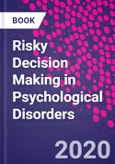Risky Decision Making in Psychological Disorders provides readers with a detailed examination of how risky decision making is affected by a wide array of individual psychological disorders. The book starts by providing important background information on the construct of risky decision making, the assessment of risky decision making, and the neuroscience behind such decision making. The Iowa Gambling Task, Balloon Analogue Risk Task, and other behavioral measures are covered, as are topics such as test reliability and the pros and cons of utilizing tasks that have strong practice effects. The book then moves into how risky decision making is affected by specific psychological disorders, such as addictive behaviors, anxiety disorders, mood disorders, schizophrenia, sleep disorders, eating disorders, and more.
Please Note: This is an On Demand product, delivery may take up to 11 working days after payment has been received.
Table of Contents
Section I: The assessment of risky decision makingChapter 1. An introduction to risky decision makingChapter 2. Measurement methodsChapter 3. Reliability and validityChapter 4. Neuroscience and associations with other executive functions
Section II: Risky decision making across psychological disordersChapter 5. Anxiety: state-dependent stress, generalized anxiety, social anxiety, posttraumatic stress disorder, and obsessive-compulsive disorderChapter 6. Disruptions of mood: positive and negative affect, depressive disorders, and bipolar disordersChapter 7. Disordered eating behaviors: anorexia, bulimia, binge eating, and obesityChapter 8. Sleep deprivation and sleep-related disordersChapter 9. Impulsivity and attention-deficit/hyperactivity disorderChapter 10. Addictive behaviors: gambling and substances of abuseChapter 11. Schizophrenia and delusional disordersChapter 12. Conclusions and future directions








